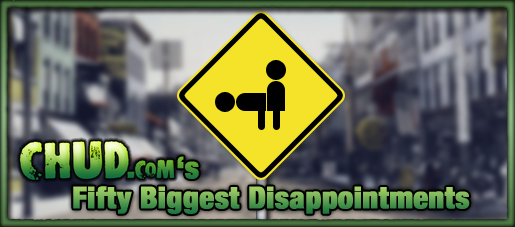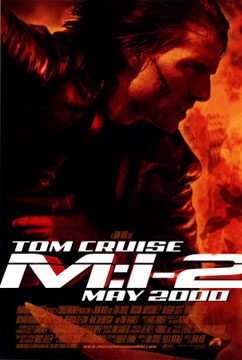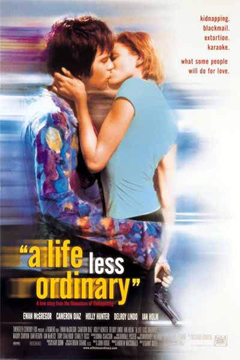
Welcome to the next CHUD List.
We’ve
tackled our essentials list and the continued revelation of our Kills
List from 2003, and now that we’ve begun the beguine, we must continue.
Behold:
The CHUD.com Top 50 Disappointments.
A
quick word on the criteria. We could very easily have spent this whole
article discussing sequels and prequels and adaptations of television
shows and called it a day. Instead, we tried to go a different route.
Also, from a master list of over 100, the involved parties (Devin,
Jeremy, Micah, Russ, and myself) all killed off a choice for each one
we claimed. As a result, we’ll run a big list at the end of this of the
‘ones that got away’. So, here is day one of many where we chronicle
the 50 Biggest Disappointments. Two a day, every week day for five
weeks. In no particular order: #14 – Mission Impossible 2 (2000, dir. John Woo)
#14 – Mission Impossible 2 (2000, dir. John Woo)
The
smear of John Woo’s increasingly disappointing American output was momentarily
wiped clean in 1997 with the release of the ham-powered action opus Face/Off.
While a minor triumph, it still went a long way to restoring faith in Woo being
able to work within the Hollywood studio system while turning out films
that could at least entertain greatly, even if the Woo resonance/heart of old
wasn’t there. Shortly thereafter, he decided to accept an assignment that would
mark the height of his commercial potential: the sequel to the big screen
version of Mission: Impossible. Upon accepting, he would find that it
indeed was not long before he – and the project – would self-destruct.
Setting
a troublesome pattern for all Mission: Impossible sequels, M:I-2
would prove to be a nightmare from beginning to end. Directors jumped on and off.
The story was designed from the centerpiece action sequences backwards. Worst
of all, Tom Cruise had dominion over every facet of the production, making him
a ghost co-director along with Woo. All that combined with on-set dissention,
delays, and various other problems to create a film that barely made it to
screen. Still, Woo signed off with Cruise and the film on good terms, and there
was good reason to believe that the end result would be worth all of the bother
given the titans involved both behind and front of the camera. I mean, John Woo
given the budget of a lifetime by a producer/star/fan to deliver a definitive
action epic? Regardless of how it got made, how can that miss?
You
start by saddling it with a ridiculous plot hinging on viruses and stock option
schemes. Sink things further by turning quintessential company man Ethan Hunt
into Tom Cruise a flamboyant feather-haired, cut-rate James Bond. Woo’s
trademark action had descended to the point of unintentional parody as limp gun
battles and ill-fitting dove flights proved that he was scraping the bottom of
his cinematic trick barrel. And while the “loner betrayed” story of the first
film required that Cruise go it alone against the odds, here amidst all the sturm und drang, they forgot to include
any sort of reasonable rationale for Hunt basically saving the world
single-handedly while being cheered on by his black techie friend and the guy
who served them both at Outback Steakhouse the night before. Oh, wait…those
were his team members?!
It’d
actually be dandy if you could simply write off M:I-2 as a hollow, noisy
amusement park ride that you could turn your brain off for or munch popcorn too
or whatever cliché activity you want to use to justify mindless filmmaking. But
even on that level, it’s flat soda. The thrills are non-existent. The big set
pieces that preceded the actual script hardly justified such consideration. Was
there a single director who lay awake at night in the months after wondering
how the holy fuck he was going to top that laughable motorcycle duel at the
climax? More likely they were wondering why Tom Cruise was doing Guile flash kicks
when the movie version of Street Fighter already came out six
years previous. When all was said and done, Woo had all but finished himself as
a legitimate source of badass onscreen action and the franchise, while still profitable,
had much to answer for in its next installment.
– Micah
Travesty Scale (1-10): 8 out of 10
 #13 – A Life Less Ordinary (1997. dir. Danny Boyle)
#13 – A Life Less Ordinary (1997. dir. Danny Boyle)
Third time isn’t always the charm. In 1997 Danny Boyle was riding the
high of Trainspotting, which had broken out of the arthouse ghetto
into massive awareness and unexpected popularity.
Side benefits of success: loads of people realized that Boyle’s first
movie had also been pretty great, and they all became immediately,
intensely hungry for the next project. With word that A Life Less
Ordinary would reunite the writer/producer/director team of John
Hodge, Andrew McDonald and Boyle, things looked like they were set.
And hey, Ewan McGregor was back, too! This time, as a janitor who’s
fired, replaced by a robot and dumped by his girlfriend, played by the
pre-There’s Something About Mary Cameron Diaz. Add Ian Holm as the
Diaz daddy, Delroy Lindo and Holly Hunter as not exactly peaceful
angels and Stanley Tucci and Dan Hedaya and this might have been an
updated version of the classic screwball comedy formula.
Instead, it’s just a weird, oddly atonal mess. The same virus that
caused the Coen Brothers to make two crappy movies in a row might have
been born in this lab; while there are moments of clarity, humor and
gently appealing violence, for the most part A Life Less Ordinary
feels as if it’s really trying to be both broad and edgy.
Trainspotting had achieved exactly that with (seemingly) no effort at
all, making this look like a vain wanna-be in comparison.
No, it ain’t fair to judge the movie only in the contextual
post-breakout bubble of 1997, so look at it now. What you’ll see is a
flick that doesn’t cohere, instead lurching from comedy to romance to
a sort of fantasyland exploration of Stockholm Syndrome. Yeah, there’s
a fun dance sequence in there, but there’s one in Spider-Man 3, too.
McGregor can be as charming and light on his feet as he wants, but
that ain’t saving this one.
At least we could rely on Boyle to assemble a solid soundtrack, this
time even nabbing an original track. So while the movie languishes,
dusty and forlorn on most DVD shelves, that mixtape I made a decade
ago that leads off with Beck’s ‘Deadweight’ still gets some regular
play.
– Russ
Travesty Scale (1-10): 5 out of 10
Previously Disappointing:
- The Ladykillers
- Once Upon a Time in Mexico
- Bram Stoker’s Dracula
- Ultraviolet
- New York, New York
- Billy Bathgate
- Star Trek: The Motion Picture
- Willow
- Superman Returns
- Blade: Trinity
- Art School Confidential
- Lifeforce
- Bonfire of the Vanities
- Exorcist: Dominion
- The Black Hole
- Harlem Nights
- The Last Castle
- Ghostbusters II
- Love on the Run
- Full Frontal
- Celebrity
- Alien Resurrection
- Dune
- From Hell
- Hook
- The Replacement Killers
- Godzilla (1998)
- Tideland
- Dogma
- Reindeer Games
- Rosewood
- The Good German
- World Trade Center
- The Cotton Club
- Mission: Impossible II
- A Life Less Ordinary
Official Message Board Discussion.